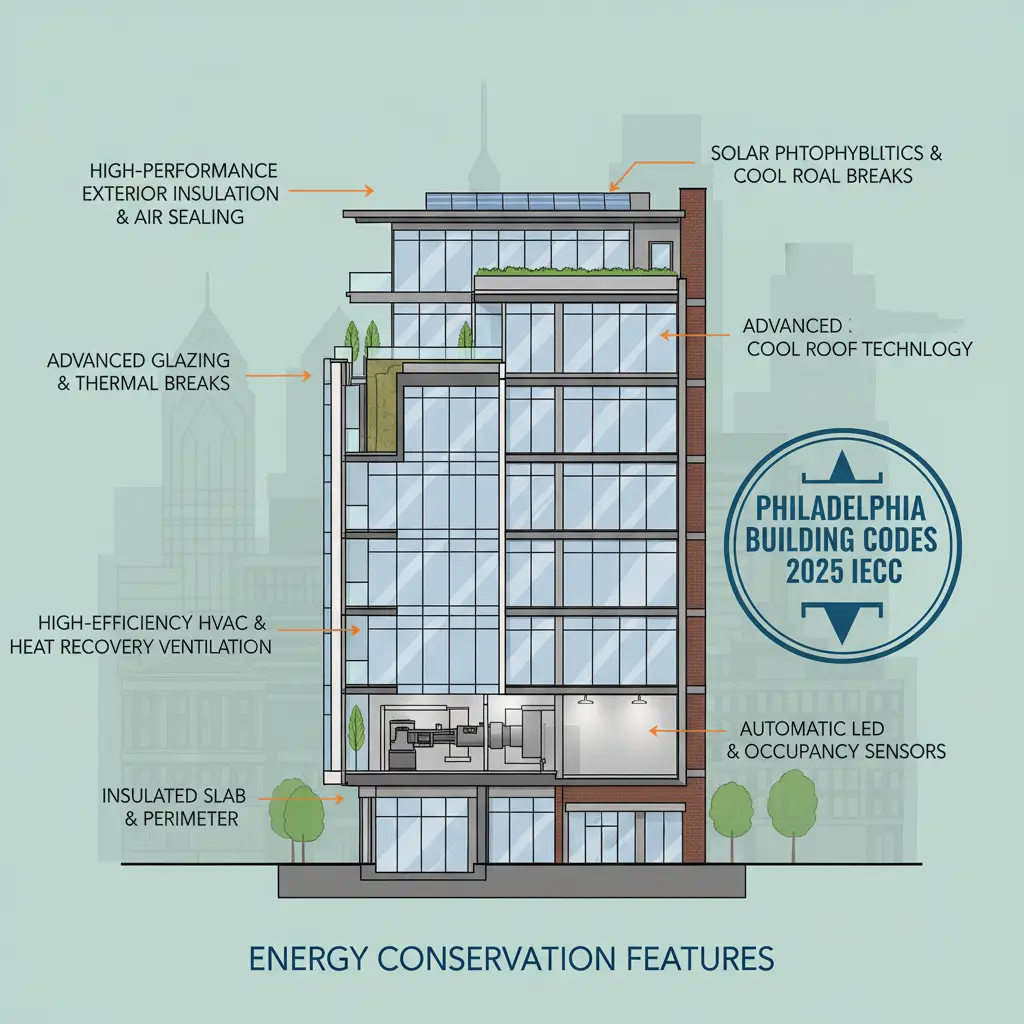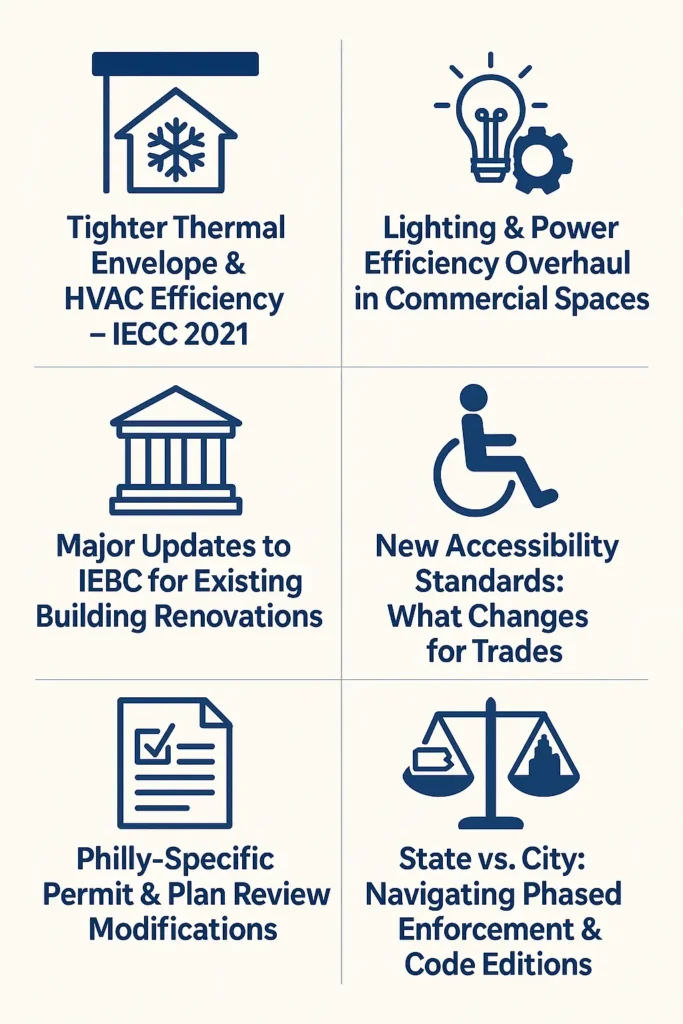Philadelphia’s construction landscape is evolving fast. With the Philadelphia building codes 2025 updates now in play, trade pros like plumbers, electricians, and general contractors must adapt quickly. These changes aim to boost safety, cut energy use, and streamline permits. But for many, they bring confusion and potential delays.

Don’t worry. This article dives deep into the key shifts. You’ll learn what changed, how it affects your work, and simple steps to stay compliant. By the end, you’ll feel ready to tackle any Philly project without headaches. Plus, we’ll share tips from years in the trenches.
Why These Changes Matter for Philly’s Construction Scene
Philadelphia building codes 2025 aren’t just paperwork. They shape how we build safer, greener structures across the city. From rowhouse renovations in Fishtown to high-rises in Center City, every trade job feels the impact.
These updates align with state goals for uniformity. However, local tweaks keep Philly’s unique vibe intact—like stricter flood rules near the Schuylkill. Ignoring them? That means fines up to $2,000 per violation or project shutdowns. Ouch.
Moreover, compliant work builds trust. Client’s love knowing their investment meets modern standards. And for your business, it opens doors to bigger bids. So, let’s break it down.
Timeline of the 2025 Adoption
The rollout started in July 2025. That’s when Philly opted into the 2021 International Codes (I-Codes), with Pennsylvania tweaks. New permits could use the old 2018 codes until January 2026. But by now, in October, most projects must follow the new ones.
Delays happened, though. State enforcement, set for July 13, got pushed back due to regulatory hurdles. As of late July, the city released a detailed changes log. Keep an eye on the Department of Licenses and Inspections (L&I) site for the latest.
Transition periods help, but plan ahead. If your project’s mid-stream, check with L&I for grandfathering options. This way, you avoid mid-job pivots.
Major Updates in the 2021 I-Codes

The core of Philadelphia building codes 2025 is the shift to 2021 I-Codes. These cover building, plumbing, mechanical, and fire rules. They’re tougher on resilience—think better storm-proofing after recent floods.
For trade folks, the focus lands on practical tweaks. No more guessing games with vague language. Instead, clearer specs mean fewer callbacks.
Structural and Safety Enhancements
Safety gets a big lift. New rules demand stronger connections in framing to handle high winds. Expect more emphasis on guardrails and fall protection during installs. For electricians, updated wiring standards cut fire risks with better arc-fault protections.
Plumbers will notice tighter backflow prevention. It’s all about protecting water supplies in dense neighborhoods. And for HVAC pros, ventilation minimums rose to fight indoor air issues post-pandemic.
These aren’t optional. Inspectors now flag non-compliance faster, with tech like digital checklists speeding reviews.
Energy Conservation Shifts with IECC 2021
Energy rules shine here. Philly adopted the 2021 International Energy Conservation Code (IECC) in July. Compared to 2018, it pushes for 5-10% better efficiency in commercial builds.
Key wins? Tighter insulation R-values and efficient lighting mandates. Trade teams must now model energy use pre-permit. Tools like REScheck make it easier, but skip them, and your app gets bounced.
For residential jobs, solar-ready roofs become standard. This future-proofs homes and cuts utility bills. Overall, these changes support Philly’s green goals, like the 2050 carbon neutrality plan.
Navigating Permit Processes Under New Rules
Permits are the gateway to legal work. Under Philadelphia building codes 2025, the process tightens but speeds up for prepared applicants. L&I handles it all, from zoning checks to final signoffs.
Start early. Average review times? 4-6 weeks for simple trades, longer for complex ones. Digital submissions via the eCLIPSE portal save time—upload plans once, track progress online.
Step-by-Step Guide to Building Permits
First, assess your project. Need a permit? Most structural, electrical, or plumbing work does. Use L&I’s online checker.
Next, gather docs: site plans, contractor licenses, and engineering stamps if required. For combos—like new builds—bundle everything.
Submit and pay. Fees rose slightly in 2025, based on project value. Then, wait for review. Respond to comments promptly; delays here kill timelines.
Once approved, post the permit on-site. This lets neighbors know it’s legit.
Inspection and Compliance Requirements
Inspections ramped up in 2025. Now, more checkpoints for high-risk elements like foundations or electrical rough-ins. Schedule via eCLIPSE—aim for 48-hour notice.
Compliance means matching plans exactly. Deviations? File amendments quick. And remember, final occupancy certs tie it all together. Without one, no keys to tenants.
Pro tip: Document everything. Photos and logs prove your diligence if disputes arise.
Common Pitfalls and How to Dodge Them
Even pros slip up. Philadelphia building codes 2025 highlight old habits that now bite harder. Spot them early to save cash and stress.
From app errors to on-site oversights, these issues delay 30% of projects. But knowledge fixes that.
Top Mistakes in Applications and On-Site Work
Application woes top the list. Incomplete site plans or wrong sprinkler specs lead to rejections. Always double-check against the changes log.
On-site, water intrusion ranks high. New drainage rules curb it, yet many ignore grading. Result? Costly fixes later.
Foundation cracks? Common in older Philly soil. Use 2025 specs for reinforcement to avoid them. And faulty wiring—arc-fault breakers are non-negotiable now.
Another trap: Zoning mismatches. A quick pre-app consult with L&I prevents this. Finally, unlicensed subs. Verify credentials upfront; fines hit the prime contractor.
Steer clear by training your team on updates. Monthly refreshers keep everyone sharp.
Preparing Your Trade Projects for Success
Success boils down to prep and partners. With Philadelphia building codes 2025 in force, lean on best practices. Start with a compliance audit for every bid.
Team up with licensed pros who know the ropes. And invest in software for code tracking—it’s a game-changer.
Best Practices from Local Experts Philadelphia building codes 2025
Build a checklist from the I-Codes. Review it at kickoff meetings. For energy parts, partner with certified modelers early.
Communicate with clients. Explain how updates add value, like lower energy bills. This builds loyalty.
Stay updated via L&I webinars or trade groups like the Builders Association. Networking uncovers real-world tips.
Finally, budget 10% extra for compliance. It covers surprises without derailing profits.
Conclusion: Partner with PhillyTradeExperts for Seamless Compliance
Wrapping up, Philadelphia building codes 2025 bring smarter, safer building to our city. From I-Code adoptions to IECC efficiencies, these rules demand attention. But they also open doors to innovative, resilient projects.
At PhillyTradeExperts, we thrive on this. Our team of licensed plumbers, electricians, and contractors navigates updates daily. We handle permits, inspections, and installs with zero fuss. Whether it’s a kitchen reno in South Philly or a commercial fit-out downtown, we ensure compliance from day one.
Ready to build confidently? Contact us today [email protected]. Let’s schedule a free consult and turn your vision into code-approved reality. Your project deserves experts who know Philly inside out.
Book a Free Consultant
FAQs
The 2025 updates adopt the 2021 I-Codes and IECC, focusing on safety enhancements, energy efficiency, and streamlined permits. Structural rules tighten for resilience, while energy modeling becomes mandatory for larger projects.
Yes, most electrical, plumbing, or structural changes require one. Use L&I’s online tool to confirm. Skipping it risks fines up to $2,000.
New inspection points can add 1-2 weeks. But digital tools like eCLIPSE cut review times. Plan ahead to stay on schedule.
Fines start at $300 per violation, escalating to stop-work orders. Repeat issues could hit $2,000 daily.
Projects permitted before January 2026 can grandfather in. But check with L&I for specifics to avoid mid-build changes.

